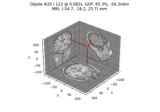mne.beamformer.rap_music#
- mne.beamformer.rap_music(evoked, forward, noise_cov, n_dipoles=5, return_residual=False, verbose=None)[source]#
RAP-MUSIC source localization method.
Compute Recursively Applied and Projected MUltiple SIgnal Classification (RAP-MUSIC) on evoked data.
Note
The goodness of fit (GOF) of all the returned dipoles is the same and corresponds to the GOF of the full set of dipoles.
- Parameters:
- evokedinstance of
Evoked Evoked data to localize.
- forwardinstance of
Forward Forward operator.
- noise_covinstance of
Covariance The noise covariance.
- n_dipoles
int The number of dipoles to look for. The default value is 5.
- return_residual
bool If True, the residual is returned as an Evoked instance.
- verbose
bool|str|int|None Control verbosity of the logging output. If
None, use the default verbosity level. See the logging documentation andmne.verbose()for details. Should only be passed as a keyword argument.
- evokedinstance of
- Returns:
See also
Notes
The references are:
J.C. Mosher and R.M. Leahy. 1999. Source localization using recursively applied and projected (RAP) MUSIC. Signal Processing, IEEE Trans. 47, 2 (February 1999), 332-340. DOI=10.1109/78.740118 https://doi.org/10.1109/78.740118
Mosher, J.C.; Leahy, R.M., EEG and MEG source localization using recursively applied (RAP) MUSIC, Signals, Systems and Computers, 1996. pp.1201,1207 vol.2, 3-6 Nov. 1996 doi: 10.1109/ACSSC.1996.599135
New in version 0.9.0.
